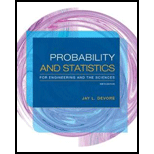
Concept explainers
a.
Prove that
a.
Explanation of Solution
Given info:
Reference- Example 5.22: The random variables
Calculation:
The probability density function (pdf) of a random variable X having a chi-squared distribution with parameter
Denote
Make the transformations:
The Jacobian determinant of the transformation is:
In that case, the above integral becomes:
Now, consider the quantity:
This is the integration of the probability density function (pdf) of the beta distribution (first kind) taken over the whole range
Thus, the cdf reduces to:
Compare this with the pdf of the chi-squared distribution. It is clearly observed that the quantity within the integral,
It is known that the cdf of a distribution is unique. Thus, using the uniqueness property of the cdf of a random variable, it is proved that
b.
Find the distribution of
b.
Answer to Problem 91SE
The distribution of
Explanation of Solution
Given info:
Reference- Exercise 71: The random variables
Calculation:
The result in Exercise 71 shows that, for a standard normal random variable, Z, the variable
The result in part a shows that the addition of two variables having chi-squared distributions with parameters
For the random variables
Thus, by generalization of the result in part a and the result in Exercise 71, the random variable
Hence, the distribution of
c.
Find the distribution of the sum
c.
Answer to Problem 91SE
The distribution of the sum
Explanation of Solution
Given info:
The random variables
Calculation:
For a normally distributed random variable, X, with mean
Thus, for the normally distributed random variables
Now,
Thus, Y is the sum of the squares of n standard normal variables.
The result in part b shows that the distribution of
Hence, the distribution of the sum
Want to see more full solutions like this?
Chapter 5 Solutions
Probability and Statistics for Engineering and the Sciences
 MATLAB: An Introduction with ApplicationsStatisticsISBN:9781119256830Author:Amos GilatPublisher:John Wiley & Sons Inc
MATLAB: An Introduction with ApplicationsStatisticsISBN:9781119256830Author:Amos GilatPublisher:John Wiley & Sons Inc Probability and Statistics for Engineering and th...StatisticsISBN:9781305251809Author:Jay L. DevorePublisher:Cengage Learning
Probability and Statistics for Engineering and th...StatisticsISBN:9781305251809Author:Jay L. DevorePublisher:Cengage Learning Statistics for The Behavioral Sciences (MindTap C...StatisticsISBN:9781305504912Author:Frederick J Gravetter, Larry B. WallnauPublisher:Cengage Learning
Statistics for The Behavioral Sciences (MindTap C...StatisticsISBN:9781305504912Author:Frederick J Gravetter, Larry B. WallnauPublisher:Cengage Learning Elementary Statistics: Picturing the World (7th E...StatisticsISBN:9780134683416Author:Ron Larson, Betsy FarberPublisher:PEARSON
Elementary Statistics: Picturing the World (7th E...StatisticsISBN:9780134683416Author:Ron Larson, Betsy FarberPublisher:PEARSON The Basic Practice of StatisticsStatisticsISBN:9781319042578Author:David S. Moore, William I. Notz, Michael A. FlignerPublisher:W. H. Freeman
The Basic Practice of StatisticsStatisticsISBN:9781319042578Author:David S. Moore, William I. Notz, Michael A. FlignerPublisher:W. H. Freeman Introduction to the Practice of StatisticsStatisticsISBN:9781319013387Author:David S. Moore, George P. McCabe, Bruce A. CraigPublisher:W. H. Freeman
Introduction to the Practice of StatisticsStatisticsISBN:9781319013387Author:David S. Moore, George P. McCabe, Bruce A. CraigPublisher:W. H. Freeman





